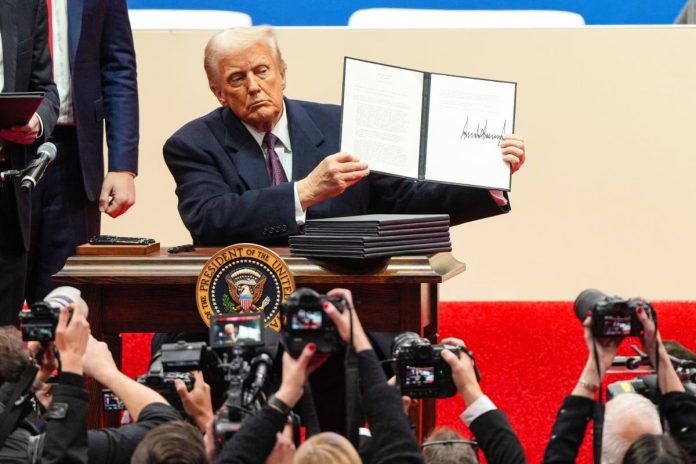Da Wei is director of Tsinghua University’s Centre for International Security and Strategy in Beijing. His research focuses on China-US relations and US security and foreign policy. In this interview, he discusses US President Donald Trump’s inauguration speech and first day back in the White House.
I’d like to start by asking about US President Donald Trump’s first day in office. While he did not impose any immediate tariffs, US reports stated that he would issue a broad memorandum directing federal agencies to assess unfair trade practices by countries including China. He also mentioned China once in his inauguration speech, vowing to “take” the Panama Canal from China. Considering these early moves, how do they signal the tone and approach Trump will adopt towards China during his presidency?
As you said, in his inaugural speech, he didn’t mention China a lot. It’s mainly about the domestic agenda like illegal immigrants, the so-called culture war, and also criticising the Democratic Party and the Biden administration, and boasting [about] the bright future of the United States. So mainly, it’s not about foreign policy issues.
His inaugural speech mainly focused on domestic issues, so that shows that for the early stages of his term, I think the domestic agenda will be his top priority – at least in the early phase, in the first several months.
Of course, the tariff issue is still there and it’s a very important topic for Trump during the campaign trail. And he did mention that he will set up the External Revenue Service, a new government agency, which I think one of its jobs … is about raising tariffs to get more revenue from other countries internationally. So I think this is still on his agenda. I think he will do that sooner or later. He also mentioned, very interestingly, President [William] McKinley, who also raised tariffs in his term almost 130 years ago.
He postponed the imposition of the tariff … to give room to, on the one hand, his government and, on the other hand, other countries, including China, for some negotiation.
Of course, we don’t know what [Chinese] President Xi Jinping and President Trump talked about during their phone call three days ago. But I think that China and the United States are now in a quite good communication process. I’m not sure if tariffs are one of those issues [discussed] but I think it would be reasonable if that’s one of the topics.
So postponing the imposition of the tariff, I think, gave room for future discussion and negotiation between the two countries. I think this is the reason why he didn’t do that on the very first day in office.
The White House published a list of Trump’s “America first” priorities, and it included a line saying that the State Department will now have an “America first” foreign policy. Can you share what this might mean for the way Trump might approach the relationship with China or what it might mean for US-China relations?
For the “America first” foreign policy, I think first it will focus on some issues that are not directly related to China. For example, the Panama Canal, and also the State Department will work with other government agencies to deal with the illegal immigrant issue. This is also a foreign policy issue with a neighbouring country of the United States. I think this is a top priority of the State Department right now.
Of course, it also represents a change in style of the American policy under President Trump’s leadership. An “America first” foreign policy means a kind of nationalistic approach in its foreign policy. The US will pay less attention or invest less in the multilateral institutions and focus more on so-called narrowly defined US interests. The US will show less interest in the foreign policy agenda like climate change and other global issues. These are the implications of the “America first” foreign policy.
Also, interestingly, he didn’t talk a lot about the US alliance system in his inaugural speech. I’m not saying that the Trump administration is going to do something very negative to the alliance system. I think we still need to wait and see, but of course obviously it’s not his immediate top priority to strengthen the alliance system. That is my reading of the so-called “America first” foreign policy.
Before the US election last year, you predicted that US-China relations were likely to deteriorate if Trump won as some of his potential policies, such as imposing tariffs, could send relations into a “free fall”. Do you still believe this is the case? More broadly, what is your assessment of US-China relations over the next four years with Trump in the White House?
Now, the situation is quite uncertain. I mean, there are different possibilities but a free fall of China-US relations is still one of the scenarios. I cannot exclude that possibility. But on the first day of the new administration, I won’t say we are necessarily doomed to have a bad relationship during the Trump administration. We still need to wait and see.
I mean, both China and the United States are communicating with each other quite smoothly. Since the presidential election in November, President Xi and President Trump have already talked twice, according to Trump. But officially, [according to] the Chinese foreign ministry, at least they have talked to each other three days before the inauguration. This time, China also sent a special envoy to the inauguration ceremony, so all of that shows that the two countries are trying to communicate and trying to at least manage bilateral relations. For that part, I think we should not be too pessimistic about bilateral relations.
There are different possibilities, but at the same time, we cannot say that we exclude the bad or negative scenario. I think it’s too early to say, but we do have a chance that through communication and negotiation, the two countries [will] have relatively stable relations and cooperate on certain issues that both sides feel [have] mutual benefits. Of course, we don’t know yet at the current phase. Comparing with my earlier prediction, I think my view now is maybe we need to wait and see for a moment.
On the campaign trail, Trump accused China of unfair trade practices and threatened to impose tariffs on Chinese goods. In his inaugural address, Trump made clear he will “tariff and tax foreign countries”. How much of Trump’s campaign rhetoric do you think will be translated into actual policies during his second term? And how might China respond if Trump does indeed push ahead with his threats?
Generally speaking, people believe that President Trump is someone who delivers his campaign promises quite well – at least in his first term – so there’s no reason to believe that President Trump will not deliver his campaign promises this time.
Having said that, I don’t think he will necessarily deliver every campaign rhetoric and promise that he has made. We don’t know how many of those promises he has made will be delivered, but I will say it’s a relatively high percentage compared with other US presidents. He did have a good record of delivering promises. We cannot predict if he will do this or that, particularly [as] President Trump [intentionally] wants to keep everything unpredictable.
Of course, if he imposes tariffs on China, China will more or less retaliate, particularly if we believe that it is not a fair deal, [if it’s done] unilaterally without negotiation with China. If the US does it in a unilateral way, my hunch is that the Chinese side will retaliate.
But by retaliation, I’m not saying that we will do it in a tit-for-tat way. For example, if the US imposes a 60 per cent tariff on China, China also imposes a 60 per cent tariff on the US. I don’t think we will do it that way.
I guess China will, through tariffs and other economic means, show our opposition to the US side and also use some instruments to deter the US side from moving forward. I don’t know at the current phase what we will do concretely and what our policy instrument is, but I think China will, by some kind of retaliation, send a signal to the American side that we oppose what they are doing and we want to stop them from moving forward further.
Trump has positioned himself as a deal maker, ready to negotiate with countries including China. How do you think the Chinese leadership perceives Trump’s character and his presidency, and what strategies might China adopt to navigate the Trump administration?
I think Trump is a person who really wants to make deals. We’ve interacted with President Trump during his first term on those deals and we did reach some agreement on the economic side like the phase one [trade] agreement.
Actually we also cooperated on some other issues, so I think there are opportunities that we can work with President Trump in his second term on striking a deal. I think it’s possible. I guess the Chinese leadership and Chinese government, of course, [assign] really great importance to this possibility. We know that bilateral relations are difficult, so we want to stabilise relations through these kinds of negotiations, and President Trump provides such an opportunity.
In order to strike a deal, I think the very important thing is to maintain open communication channels. This is the priority. This is the precondition of any potential deal. The two sides need to talk to each other. We need to understand each other’s intentions well, and then we need maybe very hard efforts to reach a deal.
I think the most important thing is the communication between the two leaders. Strategic communication between the two leaders is the most important thing because firstly, through that channel, the two sides can understand the other side’s goal or intention clearly.
And secondly, particularly on the US side, there are different views [within] Trump’s team regarding [US] policy towards China. Of course, in China we also have different ideas regarding our US policy. So if the two presidents talk to each other and set the tone for [Trump’s] second term, that will lay the foundation for the two sides to strike the deal [and] overcome or manage internally different ideas … in the two countries. These are very critical for any potential negotiation between the two countries.
You’ve previously argued that strategic clashes between the US and China are likely to persist in the years ahead, and that ties will remain relatively tense. Do you think the two countries can achieve a new sort of equilibrium with Trump back in the White House?
The competitive or difficult relationship between the two countries will be there for quite a long time. I don’t think it will change under Trump’s leadership. But it’s possible that the two sides can manage bilateral relations and stabilise the situation. I think now it’s hard to say if we can have a long-term or new equilibrium.
It’s too early to say because an equilibrium not only requires the two governments to talk to each other and strike deals but it also requires deeper compromise. This is a very complicated relationship because the players evolve in this relationship. An equilibrium requires the two sides to reach a point of balance in terms of, for example, their economic operating system.
The two sides [have to attain] relative peace and stability in their economic relationship. Both sides [have to] feel at least accepting of their economic relationship.
But at the same time, the two sides also need to reach that kind of status with their militaries – for example, [about] their nuclear capabilities and also their military relationship regarding hotspot issues like Taiwan and the South China Sea. It’s too early to say if the two sides can reach a kind of equilibrium, because I think it’s related to the medium term.
But in the shorter term, the two governments do have the opportunity to maintain stability and short-term peace. After November 2023, the bilateral relationship has been OK. It has been quite stable. So now we may have the opportunity to have another kind of stability. It’ll be a stability led by President Trump or the Republican administration.
I believe it will be very different from the Democratic one, under a Democratic White House. I think it will be very different, but it could be another kind of stability. No matter what kind of stability, if [the US] can continue the earlier stability from the Biden administration to the Trump administration, I think that will be a good way for the two countries to set up a new equilibrium and a new balance between the two countries.
When Trump took office in 2017, he withdrew the US from significant global and regional agreements including the Paris Agreement and the Trans-Pacific Partnership. This time, Trump will again be pulling the US out of the Paris accords and also from the World Health Organization. How will this reshape China’s role on the global stage, and does it provide China an opportunity to expand its influence in international affairs?
The relationship between China and the US regarding multilateral institutions is not just zero-sum [in a way that] if the US withdraws [from the institutions], China fills the vacuum. Of course China is [important] too, but the United States is the most important country in multilateral institutions and on global issues. Without US participation, those multilateral institutions will be weakened, and those global issues cannot be solved. So I think we have to admit that.
When withdrawal from the US side happens, superficially you may say China’s influence could grow. To some extent, it’s true because China may have a bigger say or influence in the multilateral institution, and other countries in the world may think that China still adheres to multilateralism while the US is doing something irresponsible [and] undermining the multilateral institution.
But if we step further, we will see that China’s influence could grow, but it’s within a less important and less relevant multilateral institution, so it’s not so meaningful. So maybe it’s good for China’s image, but more importantly, it’s bad for the US’ image. If something bad happens to the US image, I don’t think it will automatically be translated into a good thing for China’s image.
And also, as I said earlier, if the multilateral institution becomes less relevant and less important, I don’t think it can be a good venue for China or any other country to fill the vacuum to their benefit. I still hope that the Trump administration can participate at least to some extent in the more important multilateral institutions. No matter through those existing institutions or through other ways, major countries like China and the United States need to find a way to have effective global governance.





